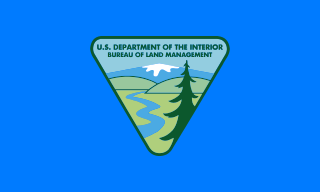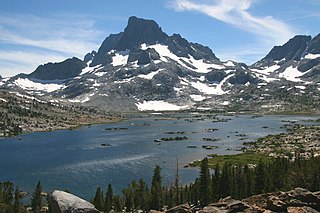Related Research Articles

The Bureau of Land Management (BLM) is an agency within the United States Department of the Interior responsible for administering U.S. federal lands. Headquartered in Washington, D.C., the BLM oversees more than 247.3 million acres (1,001,000 km2) of land, or one-eighth of the United States's total landmass.
In all modern states, a portion of land is held by central or local governments. This is called public land, state land, or Crown land. The system of tenure of public land, and the terminology used, varies between countries. The following examples illustrate some of the range.

The United States Senate Committee on Energy and Natural Resources is a standing committee of the United States Senate. It has jurisdiction over matters related to energy and mineral resources, including nuclear development; irrigation and reclamation, territorial possessions of the United States, trust lands appertaining to America's indigenous peoples, and the conservation, use, and disposition of federal lands. Its roots go back to the Committee on Interior and Insulars Affairs. In 1977, it became the Committee on Energy and Natural Resources, and most matters regarding Native Americans, Alaska Natives, and Native Hawaiians were removed from its jurisdiction and transferred to the Committee on Indian Affairs.

The question of whether to drill for oil in the Arctic National Wildlife Refuge (ANWR) has been an ongoing political controversy in the United States since 1977. As of 2017, Republicans have attempted to allow drilling in ANWR almost fifty times, finally being successful with the passage of the Tax Cuts and Jobs Act of 2017.

The Mineral Leasing Act of 1920 30 U.S.C. § 181 et seq. is a United States federal law that authorizes and governs leasing of public lands for developing deposits of coal, petroleum, natural gas and other hydrocarbons, in addition to phosphates, sodium, sulfur, and potassium in the United States. Previous to the act, these materials were subject to mining claims under the General Mining Act of 1872.

The U.S. House Committee on Natural Resources or Natural Resources Committee is a Congressional committee of the United States House of Representatives. Originally called the Committee on Interior and Insular Affairs (1951), the name was changed to the Committee on Natural Resources in 1991. The name was shortened to the Committee on Resources in 1995 by the new chairman, Don Young. Following the Democratic takeover of the House of Representatives in 2006, the name of the committee was changed back to its title used between 1991 and 1995.

The National Wilderness Preservation System (NWPS) of the United States protects federally managed wilderness areas designated for preservation in their natural condition. Activity on formally designated wilderness areas is coordinated by the National Wilderness Preservation System. Wilderness areas are managed by four federal land management agencies: the National Park Service, the U.S. Forest Service, the U.S. Fish and Wildlife Service, and the Bureau of Land Management.
The United States Senate Energy and Natural Resources Subcommittee on Energy is one of four subcommittees of the U.S. Senate Energy and Natural Resources Committee.
Senate Energy and Natural Resources Subcommittee on National Parks is one of four subcommittees of the U.S. Senate Energy and Natural Resources Committee.
The United States House Natural Resources Subcommittee on Energy and Mineral Resources is one of the five subcommittees within the House Natural Resources Committee
The United States House Natural Resources Subcommittee on Federal Lands is one of the five subcommittees within the House Natural Resources Committee. Until the 118th Congress, it was known as the Subcommittee on National Parks, Forests and Public Lands.
The Alaska Department of Natural Resources is a department within the government of Alaska in the United States. The department has the mission of responsibly developing Alaska's resources by making them available for maximum use and benefit consistent with the public interest.

The Omnibus Public Land Management Act of 2009 is a land management law passed in the 111th United States Congress and signed into law by President Barack Obama on March 30, 2009. The bill designates millions of acres in the US as protected and establishes a National Landscape Conservation System. It includes funding for programs, studies and other activities by the Department of the Interior and the Department of Agriculture, and in some cases bars further geothermal leasing, oil and gas leasing, and new mining patents on certain stretches of protected land.

Susan Elizabeth "Liz" Birnbaum served as Director of the Minerals Management Service in the United States from July 15, 2009, to May 27, 2010. Birnbaum was in charge of administering "programs that ensure the effective management of renewable energy [...] and traditional energy and mineral resources on the nation's Outer Continental Shelf, including the environmentally safe exploration, development, and production of oil and natural gas, as well as the collection and distribution of revenues for minerals developed on federal and American Indian lands."
The California Desert Protection Act of 2010 was legislation proposed by U.S. Senator Dianne Feinstein. The stated aim of the legislation was "to provide for conservation, enhanced recreation opportunities, and development of renewable energy in the California Desert Conservation Area."

The Hill Creek Cultural Preservation and Energy Development Act is a United States public law that was introduced into the United States House of Representatives of the 113th United States Congress on January 23, 2013, by Rep. Rob Bishop (R-UT). The law outlines a swap in the ownership of mineral rights of certain pieces of land located in Utah. The United States federal government, Utah's School and Institutional Trust Land Administration (SITLA), and the Ute Indian Tribe of the Uintah and Ouray Reservation are all involved in the exchange.

The Federal Lands Jobs and Energy Security Act is a bill that would require the Bureau of Land Management (BLM) to establish certain fees for activities related to the development of oil and gas on federal lands. A portion of those amounts along with a portion of fees from renewable energy projects on federal lands would be available to the agency, subject to appropriation, to cover the costs of activities aimed at increasing energy development on federal lands. The bill also would exempt lawsuits related to energy production on federal lands from the Equal Access to Justice Act (EAJA). In addition, the legislation would require the BLM to offer for sale at least 25 percent of onshore federal lands nominated by firms for oil and gas leasing. It was introduced in the United States House of Representatives during the 113th United States Congress. President Barack Obama threatened to veto the bill on November 19, 2013.

The North Fork Watershed Protection Act of 2013 is a bill that would withdraw 430,000 acres of federal lands in Montana from programs to develop geothermal and mineral resources. The law would forbid mountaintop removal mining and other natural resource development. The affected lands lie adjacent to Glacier National Park and already have some protections. The bill follows up on an agreement between Canada and the United States on how to protect the trans-border area from the effects of mining. In the 2010 agreement, Canada agreed not to do any additional mining on the British Columbian Flathead with the expectation that Montana would do the same thing to its land.

The Lowering Gasoline Prices to Fuel an America That Works Act of 2014 is a bill that would revise existing laws and policies regarding the development of oil and gas resources on the Outer Continental Shelf. The bill is intended to increase domestic energy production and lower gas prices.
The Interior Board of Land Appeals (IBLA) is an appellate review body that exercises the delegated authority of the United States secretary of the interior to issue final decisions for the United States Department of the Interior.